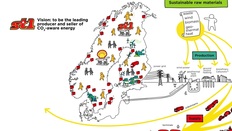- Construction starts in autumn 2023, with operations expected by end of 2023.
- St1 signed a long-term off-take contract with Borås Energi och Miljö.
- The project is supported by Klimatklivet, a Swedish climate investment program.
- St1 will upgrade and liquefy biogas from food waste and sewage sludge.

Project Overview
Energy company St1 has decided to construct a biogas upgrading and liquefaction refinery in Sobacken, Borås. This decision follows a long-term off-take contract with Borås Energi och Miljö to purchase raw biogas. As part of the agreement, two public gas filling stations in Åhaga and Hulta will be transferred to St1, which plans to expand its biogas filling network in the Nordics.
Construction and Timeline
Construction is set to begin in autumn 2023, with the biorefinery expected to start operations by the end of the year. St1 has partnered with Wärtsilä Gas Solutions to supply the necessary biogas upgrading and liquefaction facilities. The project has received support from Klimatklivet, a Swedish investment program aimed at reducing climate impact.
Collaboration and Value Chain
St1 and Borås Energi och Miljö are collaborating to create a strong value chain in renewable biofuels. St1 will upgrade and liquefy the raw biogas produced by Borås Energi och Miljö from food waste and sewage sludge, distributing it through its expanding network.
Market Presence
St1 holds about 30% market share in Sweden's road transport biogas segment, with operations in Southern Sweden and Stockholm. The company has six biogas production and upgrading refineries in Sweden, including majority-owned subsidiaries Söderåsen Bioenergi AB and Falkenbergs Biogas AB.
Expansion in Finland and Norway
St1 began its biogas business in Finland and Norway last year. In Norway, it is working with Knapphus Energi and Nor-log to build biogas infrastructure. In Finland, St1 has partnered with food company Valio to produce renewable biogas from dairy farm manure and other agricultural by-products, targeting a production capacity of up to one terawatt-hour (TWh) by 2030.

